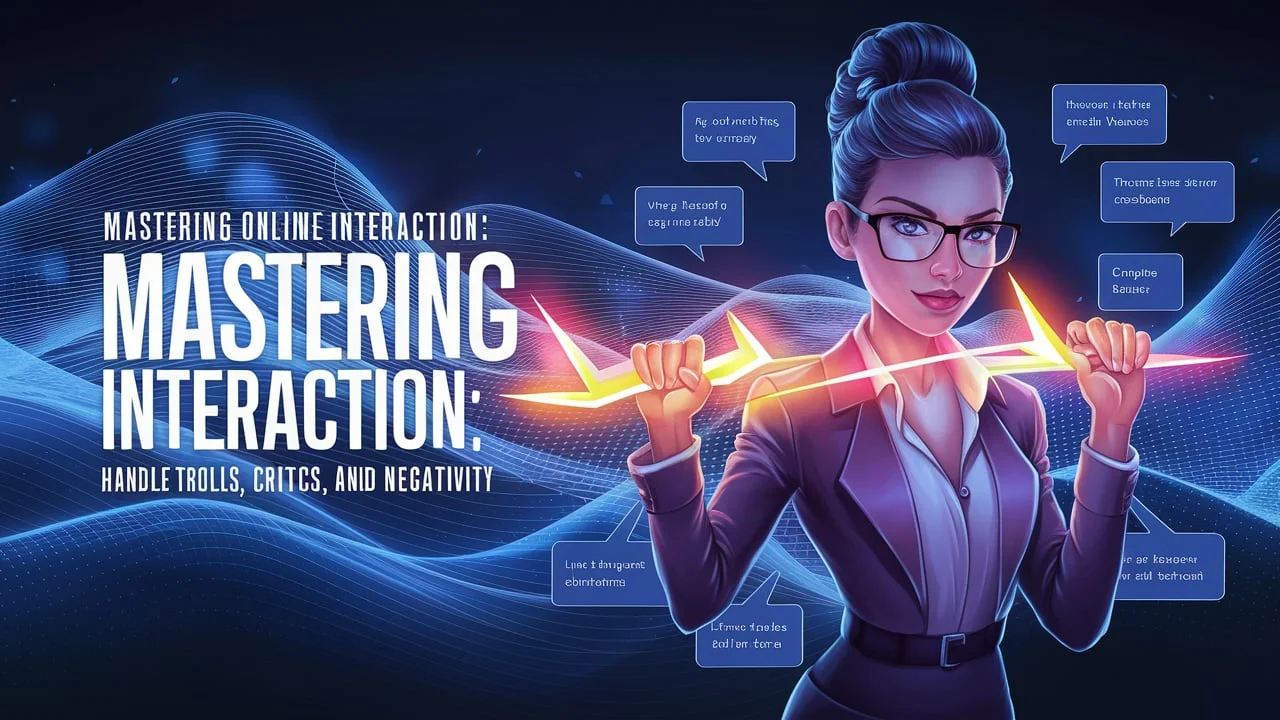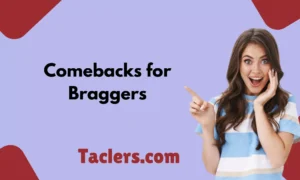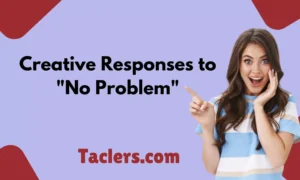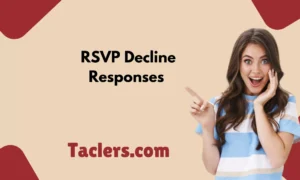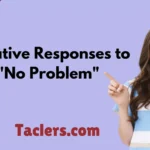In today’s digital age, online interactions have become an integral part of our daily lives. Whether it’s engaging on social media, competing on online gaming platforms, or navigating dating apps, the virtual world is full of opportunities to connect—but also rife with negativity. Dealing with trolls, critics, and unsolicited negative comments is something most internet users encounter. This guide will equip you with practical strategies to handle such situations effectively, allowing you to maintain your mental well-being and assert your presence online.
Understanding the Importance of Handling Online Negativity
The internet is a double-edged sword. On one side, it offers platforms for connection, creativity, and community. On the other, it exposes users to negativity from individuals who take advantage of the anonymity and reach that online platforms provide. Whether it’s a troll on social media, a critic in a gaming forum, or an unsolicited negative comment on a dating app, the impact of these interactions can be profound.
The Psychological Impact of Negativity
Negativity online can lead to stress, anxiety, and a decrease in self-esteem. Studies have shown that exposure to negative comments and online harassment can have long-term effects on mental health, contributing to conditions such as depression. This is why it’s crucial to develop a toolkit of responses that allow you to navigate these interactions without letting them affect your well-being.
The Power of Assertive Responses
A well-crafted response can do more than just shut down a troll or critic; it can reaffirm your self-worth, set boundaries, and even turn a negative situation into an opportunity for personal growth. Assertiveness doesn’t mean aggression; it means standing your ground with confidence and clarity. This guide will show you how to do just that across various online platforms.
SLAY the Trolls on Social Media
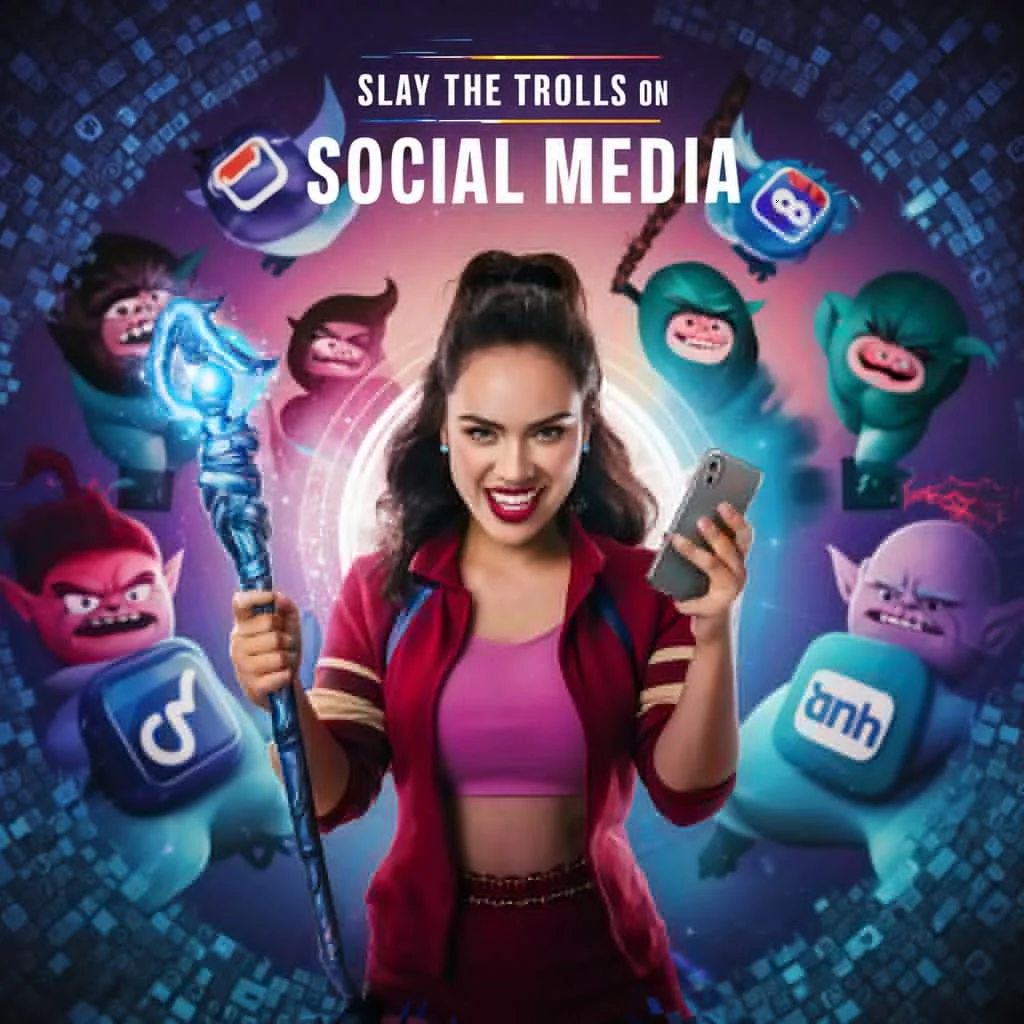
Social media is one of the most common arenas for encountering trolls—individuals who post inflammatory or off-topic messages in an online community with the intent of provoking others. Whether it’s on Facebook, Twitter, Instagram, or any other platform, trolls thrive on attention. Understanding their motives is the first step in disarming them.
Recognizing the Impact of Trolls
Trolls seek to disrupt conversations and provoke emotional reactions. Their comments are often nonsensical, deliberately offensive, or designed to derail productive discussions. The key to dealing with trolls is recognizing that their behavior is more about them than it is about you. Trolls often project their insecurities onto others, using negativity as a way to cope with their issues.
Psychological Motivations of Trolls
- Attention-Seeking: Trolls crave attention, whether positive or negative.
- Control and Power: By provoking others, trolls feel a sense of power and control.
- Amusement: Some trolls engage in negative behavior purely for their own amusement.
- Insecurity: Often, trolls are insecure individuals who use negativity to mask their own self-doubt.
Crafting Effective Responses to Social Media Trolls
When responding to trolls, it’s essential to stay composed and avoid getting emotionally involved. Here are some examples of assertive responses that can help you SLAY the trolls:
“My life is fantastic, thanks for your concern. Maybe you should focus on improving yours.”
This response is a subtle way of turning the troll’s negativity back on them. By expressing that your life is going well, you take away the power of their insult. Suggesting they focus on themselves deflects their attention from you and puts the focus back on their behavior.
“I’d rather have no life than have one filled with negativity like yours.”
This retort highlights the value of positivity in your life while subtly criticizing the troll’s choice to dwell in negativity. It communicates that you prioritize a life of happiness over one of conflict and drama.
“Unlike you, I don’t need validation from strangers on the internet.”
This statement is a powerful way to assert your confidence and independence. By indicating that you don’t rely on others for validation, you undermine the troll’s attempt to belittle you.
“I’m living my best life, and your opinion won’t change that.”
Reinforcing the idea that you are content with your life and unaffected by the troll’s opinion can be an effective way to shut down their negativity. It sends a clear message that their words have no impact on your happiness.
“I’ll get a life when you learn to mind your own business.”
Sometimes, a direct approach is necessary. This response is a straightforward way to tell the troll that their opinion is neither wanted nor relevant. It establishes a boundary that you expect them to respect.
Setting Boundaries and Moving On
While these responses can be effective, sometimes the best response is no response at all. Trolls thrive on attention, and when you deprive them of it, they often lose interest. Setting boundaries, such as blocking or reporting the troll, can also be an effective way to protect your mental well-being and maintain a positive online environment.
PWN the Critics on Online Gaming Platforms
Online gaming is another arena where negativity can run rampant. The competitive nature of gaming, combined with the anonymity of the internet, creates an environment where trash talk and criticism are common. However, not all criticism is created equal, and it’s essential to distinguish between playful banter and malicious comments.
Understanding the Culture of Online Gaming
Gaming communities are often built on competition, and with competition comes a certain level of trash talk. While some players engage in friendly banter, others take it too far, crossing the line into harassment or toxic behavior. Understanding the culture of online gaming can help you navigate these interactions effectively.
Types of Negative Interactions in Gaming
- Trash Talk: Playful banter that is part of the gaming culture.
- Criticism: Negative feedback that can be constructive or destructive.
- Harassment: Malicious behavior intended to intimidate or demean others.
- Cheating Accusations: Claims that someone is cheating, often used to discredit their success.
Crafting Effective Responses to Gaming Critics
When faced with negative comments in a gaming environment, it’s important to maintain your composure and respond in a way that defuses the situation without escalating it. Here are some responses that can help you PWN the critics:
“I have a life, and it includes kicking your virtual butt.”
This response is both confident and playful, asserting your dominance in the game while keeping the tone light-hearted. It shows that you’re not taking the criticism too seriously and are focused on enjoying the game.
“At least I have a life outside of this game, unlike you.”
This comment highlights the importance of a balanced life. It suggests that you have interests and responsibilities outside of gaming, subtly implying that the critic might need to broaden their horizons.
“I’ll get a life when you learn how to play without cheating.”
Accusations of cheating can be particularly frustrating, especially when they’re unfounded. This response not only calls out the critic’s behavior but also shifts the focus away from you and onto their potential wrongdoing.
“I’d get a life, but then I’d miss out on entertaining comebacks like this one.”
Humor is a powerful tool in disarming critics. This response shows that you’re more interested in having fun than engaging in negativity, which can often diffuse a tense situation.
“My life is great, but thanks for your concern. Now, how about you get a personality?”
This response is a clever way to turn the tables on a critic. By thanking them for their concern (even if it’s not genuine), you maintain a polite tone while subtly criticizing their behavior.
Balancing Assertiveness and Positivity in Gaming
While these responses can help you assert your presence in the gaming community, it’s also important to know when to walk away. If a conversation becomes too toxic, or if the criticism crosses the line into harassment, it’s best to report the behavior and move on. Maintaining a positive attitude and focusing on the enjoyment of the game can help you rise above negativity.
SWIPE LEFT on Negativity in Dating Apps
Online dating comes with its own set of challenges, including dealing with unsolicited negative comments. Whether it’s a rude message from a match or an unkind remark on your profile, it’s important to handle these situations with grace and confidence.
Navigating Negativity in Online Dating
Dating apps are designed to connect people, but they can also be a breeding ground for negativity. Some users may feel emboldened by the anonymity of the platform, leading them to make rude or inappropriate comments. However, it’s important to remember that these comments often say more about the person making them than they do about you.
Common Negative Interactions on Dating Apps
- Rude Messages: Unsolicited comments that are disrespectful or insulting.
- Inappropriate Remarks: Comments that are overly sexual or invasive.
- Negging: A form of manipulation where someone gives backhanded compliments to undermine your confidence.
- Ghosting: When someone abruptly stops responding without explanation.
Crafting Effective Responses to Negative Dating App Interactions
When dealing with negativity on dating apps, it’s crucial to respond in a way that maintains your dignity and self-respect. Here are some responses that can help you SWIPE LEFT on negativity:
“My life is too exciting for someone as dull as you to comprehend.”
This response is a confident way to dismiss someone who is trying to bring you down. It suggests that you have a fulfilling life and that their negativity is insignificant in comparison.
“Thanks for the advice, but I’m not interested in a life as miserable as yours.”
Negging is a common tactic on dating apps, where someone might give a backhanded compliment in an attempt to lower your self-esteem. This response acknowledges the comment but firmly rejects the underlying negativity.
“I’m too busy living my amazing life to worry about your opinion.”
This response is a clear way to communicate that you value your own happiness and well-being over the opinions of strangers on the internet. It shows that you’re confident in who you are and that their negativity won’t affect you.
“I’ll get a life when you learn how to treat others with respect.”
Respect is crucial in any interaction, and this response emphasizes that. It calls out the other person’s behavior and sets a clear boundary about how you expect to be treated.
“I’d rather be single than settle for someone with such a negative outlook.”
Sometimes, the best response is to walk away. This comment acknowledges that you value your self-worth and are not willing to tolerate negativity in your life, even if it means being single.
Maintaining Positivity and Moving Forward
Negativity on dating apps can be discouraging, but it’s important to stay focused on your goals. Remember that these platforms are tools for connection, and not everyone you interact with will have your best interests at heart. By maintaining a positive attitude and setting clear boundaries, you can navigate online dating with confidence and resilience.
Real-Life Case Studies: Handling Online Negativity Like a Pro
To provide a deeper understanding of how these strategies can be applied in real-life scenarios, let’s explore a few case studies. These examples will highlight the importance of assertiveness, resilience, and positivity when dealing with online negativity.
Case Study 1: The Social Media Influencer
Scenario: Sarah, a fitness influencer on Instagram, often receives negative comments about her appearance and workout routines. One troll consistently posts comments like, “You’ll never be a real athlete,” and “Your workouts are a joke.”
Response: Instead of engaging with the troll directly, Sarah decides to use the negativity as an opportunity to educate her followers. She posts a story addressing the importance of body positivity and self-love, emphasizing that everyone’s fitness journey is unique. Sarah’s response not only shuts down the troll but also strengthens her relationship with her audience by reinforcing her message of positivity and inclusivity.
Outcome: The troll eventually loses interest and stops commenting. Meanwhile, Sarah’s followers express appreciation for her message, and her engagement on the platform increases.
Case Study 2: The Competitive Gamer
Scenario: Mike, an avid gamer, frequently encounters criticism in online forums and during live streams. One particular critic repeatedly accuses him of cheating and undermines his achievements in the game.
Response: Instead of getting defensive, Mike decides to address the criticism head-on during a live stream. He demonstrates his gameplay techniques and explains his strategies, making it clear that his success is due to skill, not cheating. Mike also takes the opportunity to promote fair play and sportsmanship in the gaming community.
Outcome: The critic is silenced by the evidence of Mike’s skill, and other players in the community begin to rally behind Mike’s message. His reputation as a skilled and fair player is solidified, and his following grows.
Case Study 3: The Dating App User
Scenario: Emily, a user on a popular dating app, receives a message from a match that reads, “You’re cute, but you’d be hotter if you lost a few pounds.”
Response: Rather than internalizing the negative comment, Emily responds with, “I’m confident in who I am, and I’m not interested in someone who doesn’t appreciate that. Good luck finding what you’re looking for.” She then unmatches the person and moves on.
Outcome: Emily’s response reaffirms her self-worth and sets a clear boundary. She continues to use the app with a positive attitude, eventually connecting with someone who appreciates her for who she is.
Final Thoughts: Embrace Positivity and Assert Your Presence Online
Navigating online interactions can be challenging, especially when faced with negativity. However, by understanding the motivations behind negative behavior and developing assertive responses, you can SLAY the trolls, PWN the critics, and SWIPE LEFT on negativity. Remember that your online presence is a reflection of who you are, and by maintaining a positive and assertive attitude, you can create a digital environment that supports your well-being and personal growth.
Frequently Asked Questions (FAQs)
Q: How do I know when to respond and when to ignore negative comments?
A: It depends on the situation. If the comment is harmless or clearly meant to provoke without substance, it may be best to ignore it. However, if it’s a repeated offense or something that affects your reputation, a well-crafted response can be effective. Always prioritize your mental health and well-being.
Q: What should I do if someone continues to harass me online despite my efforts to address it?
A: If harassment continues, it’s important to take action by reporting the behavior to the platform and blocking the individual. In severe cases, consider seeking legal advice or contacting authorities if you feel threatened.
Q: How can I maintain a positive attitude when dealing with so much negativity online?
A: Focus on what you can control—your reactions and your own happiness. Surround yourself with supportive communities and practice self-care. Remember that negativity often reflects the other person’s issues, not your own.
Q: Is it ever okay to be aggressive in my responses to online negativity?
A: While it’s important to stand up for yourself, it’s usually more effective to remain calm and assertive. Aggressive responses can escalate the situation and may not lead to a positive outcome. Assertiveness without aggression is key.
Q: How can I help others who are dealing with online negativity?
A: Offer support and encouragement to those who are facing online negativity. Share your experiences and strategies, and be a positive force in your online communities. Encouraging others to stay strong and assertive can make a big difference.
In conclusion, mastering the art of online interaction requires a balance of assertiveness, positivity, and resilience. By following the strategies outlined in this guide, you can confidently navigate the digital landscape and maintain a healthy, positive online presence.

Ethan Richards, a distinguished writer at Taclers.com, excels in blending sharp insights with engaging storytelling. His background in sociology adds depth to his analysis of human reactions, making his articles both thought-provoking and entertaining. Explore the world of reactions with Ethan and see familiar moments in a whole new light.
